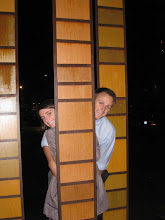
We all know that Seattle is an educated city and very progressive in its priorities, but last night I had the opportunity to witness the benefit of these demographics personally.
In 2008, California Newsreel produced a seven-part documentary called: Unnatural Causes...Is Inequality Making Us Sick? Last night, I joined about 30 people at Gilda's Club on Capitol Hill to view the documentary and participate in a dialogue session facilitated by a Public Health Educator Consultant from King County.
According to The Seattle Local Health Guide's overview, the documentary: "Goes beyond the traditional causes of poor health and takes a look at the relationship of housing, income, stress, discrimination, racism and policies that can affect life expectancy." The facts are startling.
The U.S. ranks far below other developed nations in terms of life expectancy, and in our country today, there is a growing disparity between the rich and the poor.
Since the 1970s, researchers have been able to prove a direct correlation between how social influences affect disease. For example, how a lower grade of employment (or unemployment) relates to a higher rate of not only heart disease and diabetes but all causes of death. People 'at the top' are healthier. According to the documentary, more than 70 percent of affluent people-making more than 80k/year-report greater overall health as opposed to the 37 percent who make 20k/year.
There are social gradients that affect health everywhere. The documentary cited the fact that college graduates live approximately 2.5 years longer than high school graduates. Although your life expectancy shouldn't be determined by the resources available to you, there is this underlying idea that how one can control his/her destiny ultimately leads to how healthy they become.
This correlation is supported by stress research. We all know that stress is a helpful bodily response. Stress raises cortisol levels which in the short-term can enhance immune function, increase energy and provide motivation. The natural response is for the response to occur when called upon, but then shut off when it is unneeded. When cortisol levels remain high for long periods of time (for some, entire lifetimes), however, people suffer from all kinds of issues including chronic fatigue, weight gain, impaired immune function and increased risk of diabetes and heart disease.
It's all about control. When people have the power to create an optimal environment for themselves they are able to build a sense of security that leads to better health. A perfect example of this is my life today. I am very fortunate to be able to live in a safe neighborhood just outside of downtown. I feel comfortable jogging outdoors in the morning, walking to the farmers market and going alone to the neighborhood library. How would my health be affected if I was afraid to leave my home, if I only had access to convenience stores (due to lack of public transportation and inappropriate city zoning) and fast food restaurants, and I couldn't access information?
The city is currently focused on policy. At the end of the documentary, I asked the King County Public Health representative how Seattle and the county handle the balance between implementing social justice through policy changes and empowering individuals to make a difference in their own situations. The response was a description of how the growing focus in this area is on policy change. There is a need to break the link between wealth and health by providing childcare, access to recreation, emergency preparedness in vulnerable populations, appropriate housing and transportation. People need to realize out of self-interest that if I live in a just society I'll benefit too.
There's a national program called Place Matters and a call for volunteers to facilitate these types of dialogue discussions in our communities. I hope to share this information with my neighborhood. Are you ready Queen Anne?







